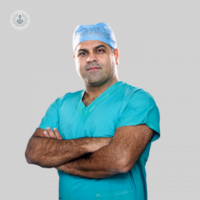All you need to know about nasal congestion
Written in association with:Nasal congestion, particularly at night, can significantly disrupt one's quality of life and can be quite the nuisance when trying to get a good night's sleep at night. In our latest online interview, esteemed Gatwick-based consultant ENT surgeon, Mr Karan Kapoor, describes and reveals the main causes of nasal congestion, and explains why it is worse at night for many people.

What causes nasal congestion? What other condition might it be a symptom of?
The causes of nasal congestion can be an interplay between a number of different things, such as a bend in the nose, allergies, or you can develop something called polyps. Polyps are non-worrying swellings in the nose that makes it more difficult to breathe. These potential causes, along with conditions such as sinusitis, can all lead to nasal congestion.
How can I unblock my nose naturally at home?
Buying a nasal decongestant drop over the counter is certainly not a good idea. Although they have great short-term effects, they are detrimental to the nose in the long run. Simple things like salt water nasal washes can naturally and effectively unblock your congested nose.
Why is nasal congestion usually worse at night?
People who are allergic to house dust mite can particularly suffer from nasal congestion at night, as house dust mite can live in bed linen. When your nose is congested, if you lie on your left-hand side, your right nostril will decongest naturally after about 15 minutes.
Then if you flip over, it will be vice versa. This is a very normal thing, and is called the nasal cycle. Interestingly, this cycle came from when the human specie lived in caves, and, in order to stop insects getting in and crawling up ther nose, the human nose naturally congested.
When should I see a doctor about nasal congestion?
You should definitely seek medical attention if you are suffering from recurrent nasal congestion, and also if it is persistent, meaning that is it not getting better.
How do doctors test for the cause of nasal congestion?
To understand the cause, the doctor will really have to prioritise finding out when exactly the patient suffers from nasal congestion, as well as what the triggers are. Then, we can carry out allergy testing and can also look up the nose with a special camera.
How is nasal congestion treated?
Salt water washes, nasal sprays, nasal drops, and surgery are all potentially effective ways to treat nasal congestion. Of course, it all depends on the severity and regularity of the patient’s nasal congestion.
The main surgical procedures to treat nasal congestion would involve the removal of polyps, surgery to straighten the nose, opening up the sinuses, or shrinking parts of the nose that have swollen up and caused you problems.
If you are experiencing nasal congestion at present and are seeking medical advice, consult with Mr Karan Kapoor today by visiting his Top Doctors profile.


